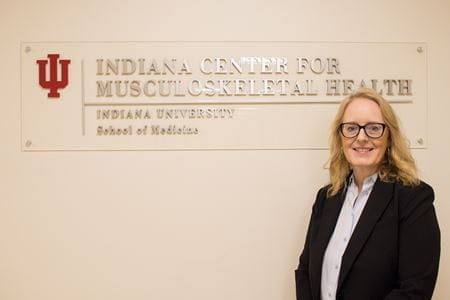When she was young, Melissa Kacena, PhD, wanted to be an astronaut. While she hasn’t launched into space herself, her bone healing research has. On Nov. 1, Kacena took command of a new mission: leading a team of more than 100 bone and muscle scientists within the Indiana Center for Musculoskeletal Health (ICMH) at Indiana University School of Medicine.
Kacena has been an active researcher with the center since its earliest days. She served as one of the authors of the white paper that led to its formation in 2017 and was part of the search committee for its inaugural director, Lynda Bonewald, PhD, who is retiring from the role.
Bonewald, an internationally recognized pioneer in osteocyte biology, has led the ICMH’s expansion, recruiting scientists with diverse areas of expertise and doubling the center’s NIH funding over the last seven years. Bonewald said Kacena is the next leader the center needs to advance its mission, take its discoveries to market and, ultimately, provide patients with new treatments and cures for bone, muscle and cartilage disorders.
“To reach its full potential, the center requires a leader who can expand relationships with industry and the musculoskeletal patient,” Bonewald said. “Dr. Kacena has the connections, experience and skill to make this a reality.”
Kacena is a collaborative researcher and patent holder with an impressive record of securing more than $21 million in grant funding. She has more than 160 peer-reviewed publications and is editor of Current Osteoporosis Reports.
Colleagues call Kacena energetic, driven and innovative. Yet she’s someone who cares deeply about the individuals on her team.
“Her passion and expertise are truly contagious, driving me to stay curious and inspiring me to be better,” said Olatundun "Ola" Awosanya, a graduate student who works in the Kacena Lab at IU School of Medicine. “I am eager to witness how she will continue the center’s legacy, but also how she will transform the ICMH as the director.”
From aerospace engineering to bone healing in space
Kacena’s background spans the fields of engineering, cell biology, and clinical and translational sciences. Her father was an aerospace engineer with Lockheed Martin in Denver, and Kacena shared those interests. She earned her bachelor’s, master’s and PhD in aerospace engineering from the University of Colorado Boulder.
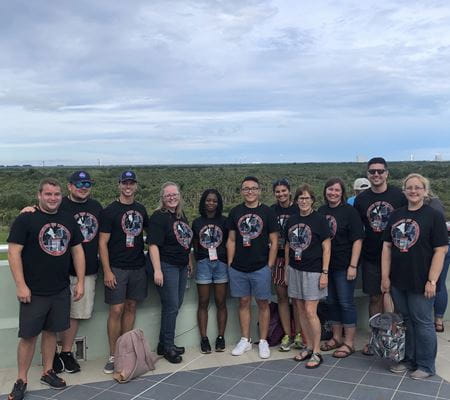 Her doctoral project took a twist when her advisor died unexpectedly. At a conference, she connected with William Landis, PhD, a Harvard Medical School professor who was working with NASA. He agreed to help her finish her doctoral studies, but she needed to shift her research from bacterial growth in spaceflight to bone loss in the zero-gravity environment. Her subsequent experiments flew on seven space shuttle missions.
Her doctoral project took a twist when her advisor died unexpectedly. At a conference, she connected with William Landis, PhD, a Harvard Medical School professor who was working with NASA. He agreed to help her finish her doctoral studies, but she needed to shift her research from bacterial growth in spaceflight to bone loss in the zero-gravity environment. Her subsequent experiments flew on seven space shuttle missions.
Those experiences led Kacena down the path of bone biology and postdoctoral training in orthopaedics at Yale University School of Medicine. She joined the Yale faculty as an assistant professor before coming to IU, where she is now a Chancellor’s Professor and a professor of orthopaedic surgery.
Kacena thought her days of studying spaceflight effects on bone were over. But a chance meeting at a U.S. Department of Defense research conference sparked an opportunity for Kacena to again send experiments into space on two NASA missions in 2017 and 2019.
Kacena’s team was the first to study the impacts of spaceflight on bone healing in male mice, which are feistier but have larger femur size as an advantage for completion of surgeries. They were also the first to max out the space station’s capacity for rodent housing with 40 animals. The endeavor required months of advanced testing with NASA Ames Research Center.
“Spaceflight experiments are what initially made me love science,” Kacena said. “Fortunately, what I thought of as a once-in-a-lifetime experience during my graduate studies became a twice-in-a-lifetime opportunity.”
Taking discoveries from lab to market
Early in her career at IU, Kacena attended a faculty meeting designed to help researchers think beyond grants and manuscripts to patents and commercialization.
“I wouldn’t have thought about that otherwise,” she said. “Many of my colleagues don’t ever consider that because they don’t know enough about the process. We have these great discoveries, and we need to commercialize them through relationships with industry partners.”
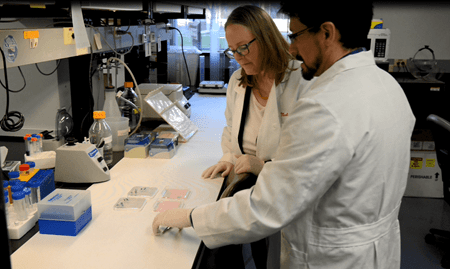 Kacena’s experiences with commercialization include a patent for a novel bone healing compound with Tien-Min Gabriel Chu, PhD, DDS, associate dean for research at the IU School of Dentistry. Several other patents are in the works.
Kacena’s experiences with commercialization include a patent for a novel bone healing compound with Tien-Min Gabriel Chu, PhD, DDS, associate dean for research at the IU School of Dentistry. Several other patents are in the works.
“He had an office next to me in Fesler Hall, and I noticed a poster he had on the wall,” Kacena said. “We got seed money from the Indiana CTSI (Clinical and Translational Sciences Institute) for a collaborative project. We used his rat model for bone healing with my idea on thrombopoietic agents, also called TPO, to find out whether it could help with bone healing, and sure enough, we got amazing results.”
Kacena is now working with researchers at Purdue University on ways to target their compound to a fracture site for accelerated healing. Kacena is also working with IU collaborators to develop therapies for reducing pain after surgery.
In recent years, Kacena has grown her network with industry collaborators at Eli Lilly, Zimmer Biomet and other important players in Indiana’s biotech sector.
“The people who commercialize are pharmaceutical or orthopedic device companies, and they can help us diversify funding and create new revenue streams,” Kacena said. “I see opportunities for the ICMH in those areas.”
Mentoring next-gen bone scientists
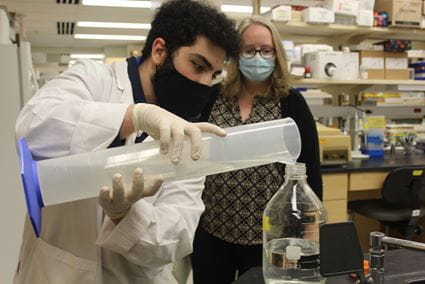 Since coming to IU in 2007, Kacena has mentored more than 130 students, many of whom have gone on to pursue careers in medicine, academia and research. In 2023, she was awarded the American Society for Bone and Mineral Research Stephen M. Krane Award, which recognizes outstanding inflammation research in the field.
Since coming to IU in 2007, Kacena has mentored more than 130 students, many of whom have gone on to pursue careers in medicine, academia and research. In 2023, she was awarded the American Society for Bone and Mineral Research Stephen M. Krane Award, which recognizes outstanding inflammation research in the field.
Kacena brought 17 lab members to the launch at Kennedy Space Center in 2019, including Awosanya — then an undergrad intern — and Aamir Tucker, DO, who worked in the Kacena Lab throughout this undergraduate years and master’s program. Both received research awards for their work on the spaceflight studies.
“Dr. K, honestly, made my career,” said Tucker, now an internal medicine resident at Mercy Health—The Jewish Hospital in Cincinnati. For several years, Tucker served as the primary surgeon on Kacena’s team. He has a rendering of his needle drivers — a scissor-like tool used in suturing — tattooed on his forearm.
“I’ve done over 1,400 procedures with those, mostly in mice, but some pigs and humans,” he said. His interest in surgery was furthered through shadowing Kacena’s husband, orthopaedic surgeon Gregory Merrell, MD.
Tucker’s left bicep bears another tattoo significant to his journey: an image of “fingers crossed,” a favorite saying of his favorite mentor, Kacena. Tucker is now crossing his fingers that he will return to IU for a fellowship in cardiology.
“Spending 11 years in Dr. Kacena’s lab was so impactful — I will never officially leave her lab,” he said. “She’s really good at identifying people who want to do something more, and she will give you those opportunities. She left a lot of doors open for me to go explore on my own.”
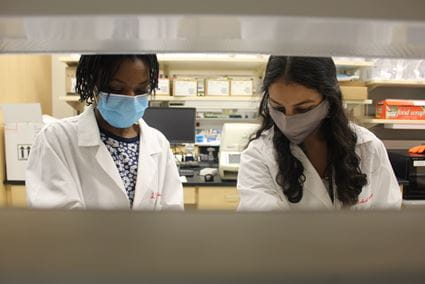 During the pandemic, Kacena’s lab began to study COVID’s impact on bones. Awosanya received an NIH student research award, with Kacena serving as her doctoral thesis mentor. She recently presented her findings at an international conference for osteoimmunology in Greece.
During the pandemic, Kacena’s lab began to study COVID’s impact on bones. Awosanya received an NIH student research award, with Kacena serving as her doctoral thesis mentor. She recently presented her findings at an international conference for osteoimmunology in Greece.
“I honestly never thought I would have an opportunity to attend an international conference, so I am very grateful to Dr. Kacena,” Awosanya said. “She’s an exceptional researcher in a male-dominated field, a brilliant and inspiring mentor, and an all-around good person.”
In the fields of aerospace engineering and orthopaedics, Kacena has often been the only woman in the room. She worked on a series of papers examining the gender make-up of authors and editorial board members in musculoskeletal journals, including the premiere Journal of Bone and Mineral Research.
“It’s a low number of women,” Kacena said. “It’s still a male-dominated field, but it is getting better. It’s progressing, but it’s not that steep of a slope.”
Kacena never let those ratios deter her. In her lab, she encourages the growth of budding scientists of all genders and stages.
“I think that all the students we have here (at IU) are smart enough to be successful, so then it comes down to perseverance and hard work,” she said.
Fueling the musculoskeletal center’s success
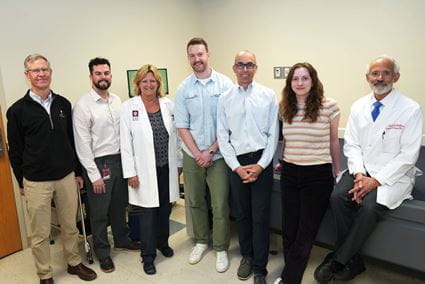 Kacena’s passion for excellence is coupled with compassion for others.
Kacena’s passion for excellence is coupled with compassion for others.
“She started out really caring about people, and that trait has served her well as she has grown as a leader,” said Michael Econs, MD, an IU Distinguished Professor and division chief of endocrinology and metabolism, whom Kacena calls her “biggest champion and mentor” at IU School of Medicine.
Econs, an original member of the ICMH, nominated Kacena for the director role. Not only do Kacena’s research interests span several fields, but she also brings a “high energy level and innovative thought process” that is sure to result in new collaborations, Econs said.
Kacena’s passion will drive the center’s continued advancement, Bonewald said.
“The end goal is to bring our discoveries to the patient,” she said. “Dr. Kacena is the ideal individual to make this happen. She is very energetic, driven and passionate about the success of the ICMH.”
